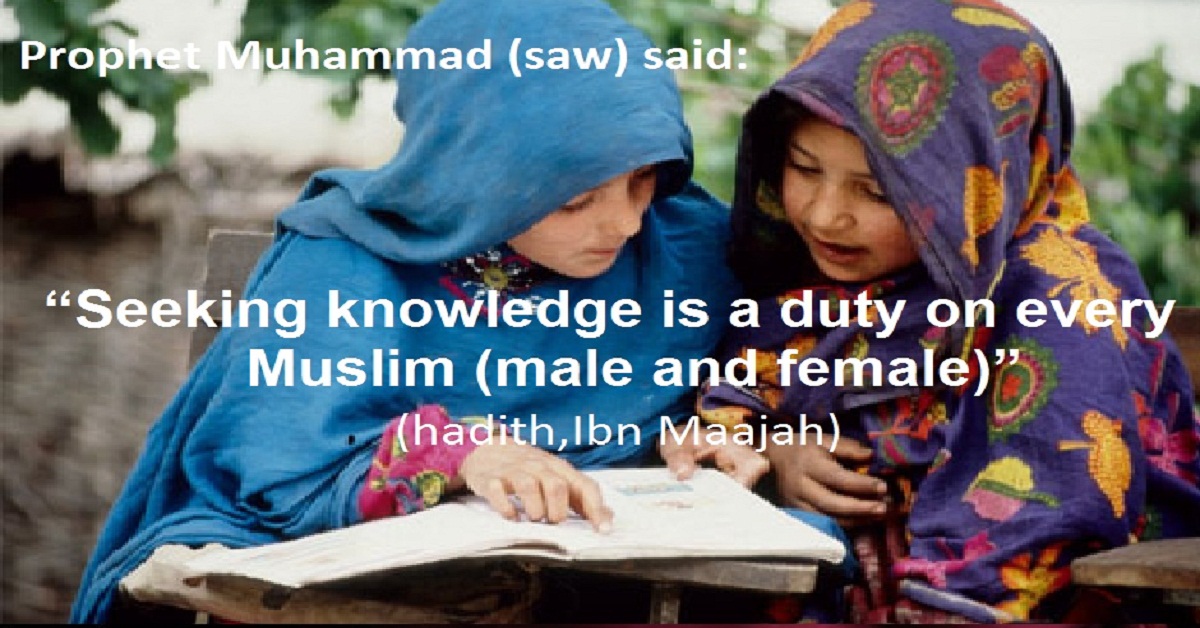
A basic principle of Islamic Shariah states that when a commandment is revealed, even if the masculine form of the word is used the female gender is also included in this commandment. If this principle is rejected then the basic pillars of Islam such as prayer, fasting, pilgrimage, and alms-due will become null and void for women. So though God Almighty and the Holy Prophet (blessings and peace be upon him) use the masculine form of sentence to describe most of the commandments, women are also bound to act and follow those rules and regulations.
The study of these verses clearly shows that the prophetic responsibilities of Prophet Muhammad (blessings and peace be upon him) through his Prophethood included recital of the verses, purgation of the self, education of the Book and wisdom and communication of knowledge. Four duties out of five directly talk of knowledge whereas the second and fifth in the sequence refer to a particular kind of knowledge, which is technically defined as mysticism or Sufism. However, if the doors of acquiring knowledge are closed for women or unjustified restrictions are imposed upon this acquisition, which religion will they act upon? How can they come to know the nature of the verses that have been revealed to them? How will they attain the wisdom and hikma that Allah Almighty wished them to know through the Holy Prophet (blessings and peace be upon him)? How are they to teach the fundamentals of the faith to their children if they have no knowledge of it themselves?
None of the verses in Quran specify that only ‘wise men’ receive admonition or that only ‘male servants’ who have knowledge fear Him. If the reference to the importance of knowledge has not been restricted within the purview of men by Almighty God, why do we persevere in creating them ourselves? A number of Prophetic traditions also talk directly about knowledge being obligatory and binding in character.
It is apparent from the Holy Qur’an and hadiths that the acquisition of knowledge is obligatory for women in the same way as in the case of men. The study of the life of the Holy Prophet (blessings and peace be upon him) also shows that he himself made special arrangements for the education and training of women.
Abu Sa‘id al-Khudri reports that some women said to the Holy Prophet (blessings and peace be upon him): ‘men have gone ahead of us (in terms of acquisition of knowledge). Therefore, appoint a special day for our benefit as well.’ The Holy Prophet (blessings and peace be upon him) fixed one day for them. He (blessings and peace be upon him) would meet them on that day, advise them and educate them about commandments of Allah Almighty. [Narrated by al-Bukhari in al-Sahih, 1:50.]
‘A’isha al-Siddiqa, mother of the faithful, was a hadith-narrator, scholar, intellectual and jurist of great standing. She is believed to have reported 2,210 traditions. Abu Hurayra, ‘Abd Allah b. ‘Amr and Anas b. Malik (may Allah be well pleased with them) were the only ones from amongst male hadith-narrators who had narrated more traditions than she did. This itself illustrates that women could not only teach women but also men after fulfilling certain preconditions.
‘A’isha bint Talha (may Allah be well pleased with her) reports:
I stayed with ‘A’isha. People from every city would come to me including the old ones (who would put forward questions) because they knew that I am her servant. And the students who were young would treat me like their sister and would present gifts (to ‘A’isha through me). Many would also write me letters (so that I could reply them back after soliciting answers from ‘A’isha. I would submit O aunt! Mr so and so has written a letter and there is his present as well. ‘A’isha would say in reply to this: O daughter! Answer his query and give him present in exchange as well. If you have nothing to give, let me know, I will give. So she would return (the present in exchange and I would send it back along with the letter). [Narrated by al-Bukhari in al-Adab al-Mufrad.]
It is important to note here that the concept of knowledge in Islam covers a broad spectrum of subjects. All interpreters of the Holy Qur’an are in agreement that the first five verses of chapter al-‘Alaq form the beginning of the sending of revelation.
Indeed those who quote the verses of the Holy Qur’an regarding the veil as an argument against women leaving the home in pursuit of knowledge are also severely misguided. If attending a school or college in the pursuit of knowledge constitutes breaking the laws of purdah then anytime a women steps out of her home would entail the same breakage of laws. This would, of course, create a ludicrous situation where a woman could never leave her home for any reason.
It is thus imperative if a nation wishes to be successful and move towards a sustainable reality, the women of that society must be given every opportunity to attain knowledge and education which is not only her due but a right that has been ordained to her by Almighty Allah.
Also Read: Enlightening Your Minds: How to boost your Memory Power with the help of Quran and Islam

Post Your Comments